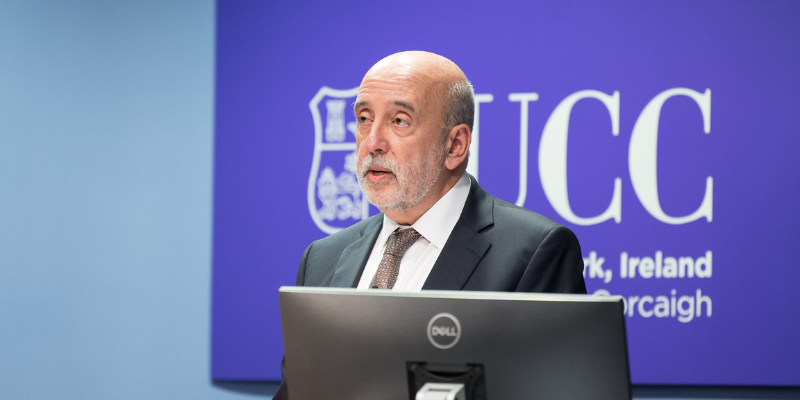
Governor of the Central Bank of Ireland Gabriel Makhlouf today (Tuesday) spoke and held a question-and-answer session with students, at University College Cork, following a meeting of the Central Bank Commission.

Governor of the Central Bank of Ireland Gabriel Makhlouf and Prof Justin Doran Head of Dept of Econmoics at CUBS
The Governor discussed several major structural changes already underway that will shape the long-term growth prospects for the economy over the next 50 years, including climate and demographic change, and the rapid advance in the development and use of digital technologies.
In his first speech of 2024, and addressing students, staff and guests, Governor Makhlouf said: “We at the Central Bank of Ireland will shortly set out our updated outlook for economic activity and inflation in Ireland over the next three years. It is important however, to also consider the performance of the economy over a much longer time horizon – what have been the key determinants of growth over the last 100 years and what key factors will shape the economy’s prospects for the next half century”.
The Governor addressed a crowd of over 100 UCC staff, students, and members of industry in Cork in the Boole Lecture theatre UCC following a meeting of the Central Bank Commission. The event served as a unique platform for students to gain a deeper understanding of economic policies, financial markets, and the role of central banks.

CUBS Students meeting Governor of the Central Bank of Ireland Gabriel Makhlouf
Professor Anthony McDonnell Interim Dean of CUBS welcomed the Governor and the Central Bank Commission visit to UCC “We were delighted to welcome Central Bank Governor Makhlouf and the commission to UCC campus this morning. His presence provided our students with a unique opportunity to gain insights directly from a distinguished leader in the financial sector. Our students are privileged to have the opportunity to engage with Governor Makhlouf, gaining economic insights and valuable perspectives he shared, further enhancing their understanding of the economic landscape.”

